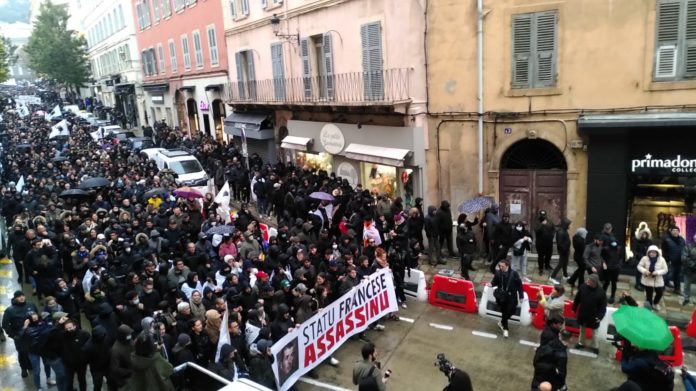The political conflict in Corsica is similar to the activity of a volcano: it can be inert for months or years, but at the most unexpected moment it explodes again with force. And that is precisely what has happened now, after the brutal assault on the prisoner Yvan Colonna (who remains on the verge of death).
The pro-independence prisoner Yvan Colonna has been serving a life sentence since 2003. A French court convicted him for the murder of the Prefect of Corsica Claude Erignac, although he has always proclaimed his innocence. Corsican nationalism, which is currently dominant on the island, has always insisted upon a demand with which we Basques are very familiar: the transfer of Colonna and the other political prisoners to Corsican prisons (they are currently in French jails). But the various French governments have always rejected this unanimous request of Corsican nationalism.
It was at the beginning of March that Colonna was brutally attacked by a jihadist prisoner in the prison of Arles (Occitania). Gilles Simeoni, Colonna’s lawyer and currently president of the Executive Council of Corsica, strongly denounced this aggression: “If the Corsican prisoners had been transferred to the prisons of Corsica, this drama could have been avoided“, he said.
The attack on Colonna was the spark that has set fire to the always inflammable political situation in Corsica. As soon as the news broke, demonstrations and riots broke out in the main cities of the island. The four nationalist political parties (Femu A Corsica, Partitu di a Nazione Corsa, Corsica Libera and Core in Fronte) denounced the attack, and two of them (the pro-independence Corsica Libera and Core in Fronte) supported the slogan of the demonstrations: “Statu francese assassinu” (“French state, murderer”).
In the great demonstration of March 6, in Corti, thousands of demonstrators, mainly young students, strongly denounced the attitude of the French government. On March 9 young pro-independence youths set fire to part of the Palace of Justice in Ajaccio. And on March 13, the streets of Bastia saw the largest demonstration in recent years, called by political parties, trade unions, the University, students and other social agencies. There were serious disturbances in front of the Prefecture.
The obdurate and cruel attitude of France towards the Corsican political prisoners has brought about the unity of all nationalist parties of the island, and also the mobilization of thousands of Corsicans in the streets. The main nationalist demands, which were dormant, have re-emerged with force: autonomy status, official status of the Corsican language, transfer locally of the prisoners and resident status. Will the French government, which has always turned its back on these demands, resist the enormous pressure from the streets of Corsica?

